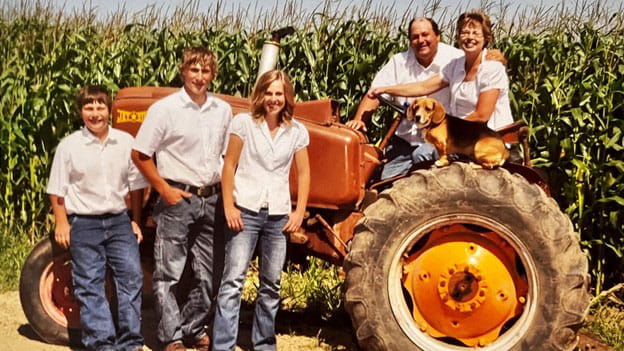The last time Jennifer Webster saw her dad was at her brother’s birthday party in late July 2023. “He asked me to give him a hug before I left,’” she says. “I remember that hug was just a little bit tighter than usual.”
A week later, her father, Brian Webster, died by suicide at age 58.
He’d been diagnosed with depression years before, she says, and had recently switched to a different antidepressant, but no one expected his death on Aug. 3.
Jennifer describes her dad, a fourth-generation grain, dairy and livestock farmer near Ellsworth, Wis., as “everyone’s confidant” – a good listener who always made time to give advice to friends and family. “He helped a lot of people behind the scenes, but he didn’t want any recognition,” says Jennifer, a commodity trader for the canola product line at Ģ��ֱ��. “Everyone relied on my dad.”
That listening ear was what led to her current career, she says. When she was about 13 years old, she became increasingly interested in her dad checking market prices. Over time, she continued to ask questions and knew from then on a career in commodity marketing was on the horizon.
“Every day, I would print out the local bid sheet,” she recalls. “When he came home from milking cows, we’d talk about what we saw in the markets.”
Raising awareness
Months after his death, Jennifer still finds herself wanting to talk to him about markets. Sometimes, she says, she cries on the way to work or finds herself stepping away from her desk during the day because she misses him and the conversations they would have around agriculture, farming and the commodity markets so much.
Her brothers and mom are struggling, too, she says. Her brothers, Tommy and Mitch, who run the farm now, miss his knowledge and advice. And her mom, Kim, is feeling lost without the man she called “the love of her life,” Jennifer says.
Instead of grieving alone, the family decided to to raise awareness of depression and suicide among farmers. Jennifer says she’s received dozens of supportive emails since the story aired on Nov. 20.
The family is working to bring the Farmer Angel Network, a nonprofit mental health organization, to western Wisconsin. The organization, whose founder lost her husband to suicide in 2018, describes itself as a farmer-to-farmer suicide prevention network.
According to the National Rural Health Association, the suicide rate among farmers is 3.5 times the incidence in the general population.
“There’s a lot of pressure on farmers,” says Jennifer. “It can be challenging to make ends meet, and you’re at the mercy of unknowns like the weather and input prices. It can be a big burden, and who do you talk to about it?”
Resources for rural families
A Ģ��ֱ�� partnership with AgriSafe aims to help producers shoulder that burden. Ģ��ֱ�� community giving has awarded $484,000 to AgriSafe in the last five years, including $160,000 for mental health initiatives. The nonprofit’s mission is to support trained agricultural health and safety professionals to bring preventive services to farm families.
The organization’s brings together health and industry professionals each month to exchange ideas about treating mental health and sharing resources with farmers. And the AgriStress Helpline is a resource similar to 988 (the national suicide and crisis hotline) specifically for rural communities in Connecticut, Missouri, Montana, Oregon, Pennsylvania, Texas, Virginia, Washington and Wyoming.
Removing the stigma
As Jennifer and her family grieve, they want to remove the stigma behind talking about mental health and let other rural families know it’s important to get treatment. That’s why they’re speaking out and raising funds to help farmers get the help they need, Jennifer says.
“I don’t want this to happen to anyone else,” she says. “My brother Tommy says it best: No one farms alone.”




